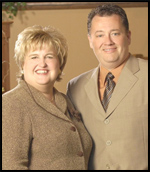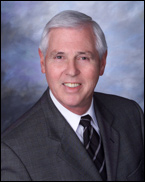Keeping Your Peace
by Pastor John R. Carter
 John Carter is the Founder and Senior Pastor of Abundant Life Christian Center in E. Syracuse, New York. Comprised of people from all walks of life and diverse cultural backgrounds, Abundant Life Christian Center is a non-denominational, charismatic, evangelical church. Since its inception in 1990, Abundant Life has been dedicated to helping people discover their fullest potential by experiencing God’s promise of abundant life through a personal relationship with Jesus Christ.
John Carter is the Founder and Senior Pastor of Abundant Life Christian Center in E. Syracuse, New York. Comprised of people from all walks of life and diverse cultural backgrounds, Abundant Life Christian Center is a non-denominational, charismatic, evangelical church. Since its inception in 1990, Abundant Life has been dedicated to helping people discover their fullest potential by experiencing God’s promise of abundant life through a personal relationship with Jesus Christ.
Pastor Carter is also the Founder and President of Mercy Works, Inc., a not-for-profit, non-religious organization established to identify and meet the various social needs of the local community.
After two years of study at Central Bible College in Springfield, MO., Pastor Carter went on to graduate from Rhema Bible Training Center in Tulsa, OK. He is ordained through the Christian Cultural Center of Brooklyn, New York, under Dr. A. R. Bernard, Sr.
You can hear Pastor Carter on his daily radio program Abundant Living, weekly television broadcast Coming to Life, as well as on the Abundant Life Christian Center website. Visit alcclife.org for additional information.

 Perhaps one of the most difficult things to maintain in ministry is the very thing that is absolutely essential to our personal success and longevity. Without this crucial element operating internally we will be continually subject to anxiety, bombarded with indecision, and riddled with self-doubt. Without its visible and tangible manifestation externally, the leader’s message and ministry to others will be undermined. This vital characteristic of Christian leadership is the peace of God.
Perhaps one of the most difficult things to maintain in ministry is the very thing that is absolutely essential to our personal success and longevity. Without this crucial element operating internally we will be continually subject to anxiety, bombarded with indecision, and riddled with self-doubt. Without its visible and tangible manifestation externally, the leader’s message and ministry to others will be undermined. This vital characteristic of Christian leadership is the peace of God.
Jesus promised us peace. In fact it is one of the last promises He made to his leaders the night before He died.
John 14:27 (NLT)
27 "I am leaving you with a gift—peace of mind and heart. And the peace I give is a gift the world cannot give. So don’t be troubled or afraid.
What an awesome promise! What a fantastic gift. The very peace that enabled Jesus to calm the storm, confront the forces of Satan, and face the horrors of the cross without wavering has been left with us – the leaders of His Church. While every believer can claim and enjoy the supernatural peace of God it is vital to consider that this promise was particularly made to the eleven men who would become the foundational leaders of Body of Christ! God wants His leaders to walk in their ministry with His peace. Regardless of the challenges, persecutions, and spiritual attacks that confront us in ministry, we have a right to claim and responsibility to demonstrate the gift of His peace.
Jesus didn’t take His peace with Him when He ascended. He left it here for us. It’s our responsibility to “pick it up”. Like all of the things Jesus promised and purchased on our behalf, we have to claim them by faith. We also have to realize that the peace of God is actually in our born again spirit from the moment we are born again. Romans 5:1 reveal that the first indication we are justified by faith is that we have peace with God. Remember that overwhelming sense of inner tranquility, complete forgiveness, and wholeness that settled over your heart when you finally received Jesus as your Lord? If speaking in tongues are the initial physical evidence of the Baptism in the Holy Spirit, then it could be said that peace is the initial spiritual evidence of the new birth.
After our salvation, peace works as a guardian over the gate of our heart and mind. It is a kind of thermostat to measure the temperature of spiritual passion; a compass to keep us on the path God has designed for us. One of the fastest ways to know you’ve missed it is the loss of peace. Our conscience is the mechanism that registers our level of God’s peace in response to our thoughts and actions. When we act, speak, or think in ways that displease our Father, our manifested peace level retreats. A rising sense of dread, fear, or inner anxiety begins to trouble us. The conscience registers this disturbance of our tranquility in order to warn us – much like those annoying warning lights and beepers on the display of your car. When something is too hot, too low, or not functioning properly a little computer deep in the car senses and reports this to the driver with lights and sounds designed to get your attention. The longer you drive the more annoying it can become. Of course the light on your display is not your enemy. The warning system is there to help you keep the vehicle going over the long haul. If you ignore the warning system long enough the problem will usually cause something to malfunction and take the vehicle off the road permanently.
I grew up on the river. Three rivers, actually. My great grandfather purchased a few acres of land shortly after World War I on the old Erie Canal in upstate New York. The canal followed the winding rivers and thousands of lakes that run like veins through the forests, hills, and mountains of New York. Our family homestead was located at the intersection of three of these ancient waterways on the very spot where the old Iroquois Confederacy was formed and forged the agreements that would become the inspiration for the U.S. Constitution.
For my brothers and I, the water was our second home. We swam, fished, speared snakes, and spent lots of time in boats. One boat we owned was my favorite. It was a 16-foot speedboat with an engine that was too powerful for a winding river. We loved it. We raced every other boat on the river and almost always ran it at full speed.
My older brother Scott loved to race. One day Scott and I were out looking for someone to race and suddenly we heard a gentle knocking coming from the back of the boat. The longer we ignored it, the louder the knocking became. Scott became concerned and thought he could fix it by pushing the engine a little faster. The farther we went, the louder the knock became until the whole boat was shaking like someone was banging the back of the boat over and over with a golf club. Smoke began to pour out of the engine. Scott, undeterred, pressed on at full speed. Suddenly a deafening bang shook the boat and the engine abruptly stopped.
When we finally found a tow to the marina the mechanic informed my father that we had “blown the rods” in the engine. Apparently the engine oil had leaked out through a loose fitting and the knocking was a warning that the pistons were becoming dry. By ignoring the knocking and soldering on at full speed we had turned a relatively small repair into a total engine replacement. Our boat was “docked” for the rest of the summer. Dad was very unhappy.
As ministers we often do the same thing as it relates to the warning of our conscience and the growing absence of peace in our lives. When we feel a disturbance in our peace it is a healthy indicator that something, somewhere needs to be addressed. Whether it’s a runaway stream of unhealthy thoughts or a conversation with a church member that for some reason leaves us feeling cold, a loss of peace always indicates something. When we feel our peace leave us we need to stop and see why. Ignoring this healthy warning system can result in us becoming acclimated to living in a state of inner anxiety that creates a low level “buzz” in the background of our lives. Over time this condition erodes our confidence in Christ, eating away at edges of our walk with Christ and relationships with others.
Instead of peace with God we feel a growing dis-ease with Him. Guilt and condemnation for past sins begins to grow in the dark places of our mind. Self-doubt replaces faith, and isolation pulls us away from our once sweet fellowship with others. Prayer becomes a dry religious exercise and we find ourselves avoiding true intimacy with God. Like Adam, hiding from God in his fig leaf toga, we begin avoiding intimate worship and daily prayer.
In the absence of peace, we have a hard time making decisions, and the power of a clear and undistracted mind recedes in the shadow of constant distraction and the complete loss of certainty. Eventually other things begin to go. Righteousness gives way to guilt, joy withers as anger and resentment take over our soul. Love and forgiveness towards others is replaced by a judging and critical attitude. Our family suffers. Our work is impacted. Our health erodes. Eventually, if we don’t stop the boat and get our peace back a crisis of some kind will force us to stop. Someone else will have to tow us to a marina for extensive repair work. And often what it takes to restore us will require a much longer process than would have been necessary had we bothered to listen to the warning signs when they first cried out for our attention.
In the same way, when your peace is disturbed it is an indicator that on some level something needs to be adjusted. In Philippians 4 Paul exhorts us to immediately address any anxiety (lack of peace) we experience by going to the Lord in prayer. He counsels us to turn our troubled thoughts into prayer requests, asking the Lord for His help and thanking him for His answer. He then gives us the important revelation. “…And the peace of God which passes understanding will guard your heart and mind in Christ Jesus…”
What a statement! Peace will guard us and protect our hearts from anxiety. That means if we can guard our peace, our peace will guard us. As ministers this is not an option. The decisions we make impact hundreds and in many cases thousands of others. If we are not in a state internal peace we will either avoid important decisions or make choices that can hurt the people we lead. Our churches, ministries, staff, volunteer leaders need us to live in the manifested peace of God. Your family deserves your best. Living and ministering out of a place of peace is the obligation of the representative of Christ. To ignore your inner peace is, frankly, irresponsible for one who is called to the ministry.
There are three things that govern your peace level more than nearly anything else. In fact when you feel your peace has been disturbed, checking and adjusting these three things will almost always bring an instant restoration of God’s peace in your life.
Number One: Boundaries
When you lack peace in our life, the first thing to check is your boundaries. A boundary is simply a line of demarcation. Boundaries create order. They help us identify distinctions in life and to bring clarity to confusion. Without boundaries, chaos results. God’s creative process in the universe began with six days of creating boundaries!
In Genesis 1:2 we see that the earth was “without form”. The Hebrew word tohuw means to fall into disrepair, to lose structure, to fall into ruin. The earth was a mass on undistinguished elements submerged in waters of chaos. God immediately begins His creative process by creating boundaries. He separated light from darkness. He formed distinctions between water and air and sealed the atmosphere of earth from the vacuum of outer space. He separated dry land from water. He distinguished carbon based plant and animal life from the soil. Finally God took man out of the earth and separated him from all the preceding forms of life He had created. God brought order to the chaos by creating boundaries.
All sin, all disease, all destruction and disaster is in some form a loss of boundary. Cancer in the body is a healthy cell reproducing without the normal boundaries that keep its development in check. Viruses, bacterial infections are invaders. Sicknesses occur when organisms invade the body, crossing the boundaries that keep us healthy. Natural disasters occur when the normal boundaries of nature are violated. When storms and tsunamis cause the sea to cross its boundary, destruction results. Satan introduced sin into this world by invading the garden. He received authority to introduce chaos into the world by getting earth’s steward to cross a boundary. Sin, at it core, is simply crossing a boundary set by God. When Adam took the fruit of the tree, he crossed a line God had set. Lying is crossing the boundary of truth. Adultery is crossing the boundary of marriage. Stealing is crossing the boundary of what separates you from your neighbor’s stuff.
In each case, when boundaries are crossed chaos, in some form, is reintroduced into the earth. It could be said that the great history of God’s redemptive work is an ongoing battle against the forces of chaos first introduced into the universe when Lucifer supposed he could “exalt his throne above the stars of God…” He crossed a line. And he has been trying to get man to do the same for 6,000 years.
When we violate boundaries within ourselves or with others our peace is affected.
Boundaries with Others
Sin has affected our ability to relate to others. We tend towards one of two extremes: either enmeshment or isolation. Both conditions are “boundary disorders”. This is especially true in churches, work environments and families.
In enmeshed relationships, boundaries are blurred. There is a loss of individuality and personal distinction from others. In enmeshed families there is generally a powerful and controlling parent or grandparent around whom the whole family revolves. Individual family members are not “allowed” to feel differently from the power person in the family. If “mom” is upset about something, it is expected that everyone else must feel the same way in lockstep. In these family systems healthy family boundaries are discouraged and a powerful pressure pervades the home where it becomes very difficult to discover one’ own identity. Children in enmeshed families live in fear and often create secret lives as way of coping with the choking sense of being controlled by someone else.
Believers, employees, and church members, who find themselves in enmeshed organizations, discover that their minds are consumed with thoughts of pleasing others and appeasing the powerful parties in their lives. While they may be very productive and effective in their work or Christian service, their motive for doing so is often fear of disapproval instead the loving service of a free heart. Over time, people who live in enmeshed relationships lose their sense of self. They find themselves living in someone else’s idea of who they should be and spending their lives in the shell of another person’s version of their life.
When this occurs a person needs to look to Jesus and find the courage to rebuild healthy boundaries with the people in their lives. It’s a blessing to have neighbors and friends over for fellowship. It’s also a blessing that they have their own home to return to. What if your neighbor came over whenever they wanted? What if they began eating in your kitchen every night? Using your bathroom without seeking your permission? Sleeping in your bed? The blessing would be over. Any healthy person would say something, and if necessary do something to insure the invasions ceased.
But when people live in enmeshed families, jobs, churches, or ministry staffs, the lines between service and slavery are blurred. Individuals can no longer think about their own dreams, think their own thoughts, or make decisions about their own lives without fear of what others will think. This fundamental right to your own life is eroded when you become pledged to make someone else “happy” without regard to your own individuality. Is it any wonder you don’t have any peace?
The apostle Paul said, “If I should still seek to please men, I should no longer be a servant of Christ”. You cannot live to please man and live to please God. Many people spend their whole lives living someone else’s ides of what their life should be and never get around to discovering who they are in Christ.
Healthy Pastors, healthy spouses, healthy parents, healthy leaders seek to influence those they lead without endeavoring to control them. They respect the distinction and allow others to think, feel, and sometimes choose differently without punishing them. If you have lost your boundaries with others, its time to find your voice, tell your neighbors to go home, close and lock your front door, and keep the intruders out until they learn to respect your boundaries. Your peace will return once you define some boundaries with others.
Disconnected Relationships
The other extreme is disconnected relationships. This is a boundary disorder of extreme separation. Fences become walls without windows or gates. Homes become moated stone castles, and people live in emotional isolation from others God has placed in their lives. In disconnected family systems no one empathizes or feels what others are feeling. In fact family members are uncomfortable with expressing passion or strong feelings of any kind – except anger. People live so disconnected from one another that when a tragedy occurs, or something obviously painful happens everyone pretends that nothing is wrong.
When disconnection happens in churches and ministries, the emphasis is almost exclusively on the individual’s responsibility to care for themselves. Real life problems and challenges are rarely acknowledged or discussed. Staff and congregation members communicate on surface level with one another according to culturally accepted vocabulary and content, and go home to private lives unshared with the others in the organization. There is distinction without connection. It is a terribly isolated and strangely lonely way to live.
Sometimes the reason we have lost peace is because we have created boundaries of isolation that don’t allow for healthy relationship. In this case one needs to reconnect with Christ on a deep and personal level. The heart needs to be thawed with the intimacy of deep worship, passionate praise, and loving intercessory prayer. Holes have to be punched in those stone walls. You will have to venture out of your castle, walk among the dangerous lives of others and open your heart to truly sharing your life with them. Like a severed limb reattached to the blood supply, our life will slowly turn pink again. Overtime we will feel again. And eventually we will be using that formerly frozen limb the way God intended us to use it. Peace will return to the heart.
Boundaries with Self
The first place to check when your peace is disturbed is your own life. God designed our hearts to sound the alarm when our actions, thoughts, or words are incongruent with His values and purposes for us. You know the drill. After a conversation in which you just “told it like it is” you walk away will that growing feeling of spiritual indigestion. Following a movie of favorite television program there is this sudden urge to take a shower. At the end of a long day you look in the mirror and notice that your stomach, hips and face no longer conforming to their former, fitter locations. A quick reflection on your eating habits that day recover memories of consuming too much, too often.
Like that belly crossing the boundary of your belt, a life that is out of control internally will eventually manifest externally. When we lose boundaries with ourselves our disciplines soften. The habits of self-control give way to living for the moment, going by our feelings, and taking the paths of least resistance. We got sloppy. We start operating without structure, and begin flying by the seat of our pants. Finances are neglected, bills pile up, and spending becomes a way to comfort our distracted and lazy minds. Life begins to “pile up” and we find ourselves either late or unprepared for nearly every meeting, every church service, every deadline, every family event, every moment. All to often in order to still the growing dis-ease in our belly we eat more comfort food, watch more TV, make serial phone calls to anyone who will talk to us, spend more time surfing the web in a frantic effort to comfort our disquieted hearts.
It doesn’t work. Undisciplined behavior cannot bring peace to a life that has forfeited peace through undisciplined behavior. Read that last sentence again. Selah.
Paul said it like this, in 1 Corinthians 9:25-27 (NLT):
25 To win the contest you must deny yourselves many things that would keep you from doing your best. An athlete goes to all this trouble just to win a blue ribbon or a silver cup, but we do it for a heavenly reward that never disappears.
26 So I run straight to the goal with purpose in every step. I fight to win. I’m not just shadowboxing or playing around.
27 Like an athlete I punish my body, treating it roughly, training it to do what it should, not what it wants to. Otherwise I fear that after enlisting others for the race, I myself might be declared unfit and ordered to stand aside.
I know. Ouch! Before you run for the Oreos take a deep breath and think about it. Our good works cannot save us nor do they qualify us before our Father in heaven. Our Father accepts us without condition based on the perfect and complete work of His Son on our behalf. His acceptance it both total and eternal. We can rest in the permanence and power of the Blood of Jesus to finish the good work He began in us. But there is a difference between personal salvation and personal service.
Paul is not advocating a works based relationship with God. He is advocating a lifestyle of discipline as the obligation of those who have received such a marvelous salvation. He is especially telling us that as a minister he has a particular obligation to keep boundaries in his life. Or after I have enlisted others for the race, I myself might be…ordered to stand aside.” We don’t have to think very hard to recall testimonies to this truth from our own generation in charismatic ministry. How awful it is to be gifted and called to minister to people that one is unqualified and unfit to lead. Maintaining boundaries with ourselves is not an option for ministers and leaders that want to make an impact on the lives of others.
The great hope of every believer and minister alike is the wonderful mercy of God. 1 John 1:9 is a reminder that whenever we lose our peace through sin or ignoring healthy boundaries with ourselves, God is ready to hear our confession and cleanse us from the guilt. The Blood of Jesus not only erases the fact of our missteps, it also provides the power to face change. There is a difference between forgiveness for past sins and deliverance from the persistence to sin. His Blood is covers both. Don’t be satisfied with forgiveness. Claim your right to be free!
If you are lacking peace because your boundaries with yourself have fallen into disrepair, it’s time to arouse your inner “mason”. Your peace will return when your walls are repaired and your fences mended. It’s useless to corral the things that have escaped your life until you fix the breaches in your behaviors that let them run free. The Apostle Paul played the role of head coach when he exhorted the Hebrew Christians to shake off their sloppy spirituality and self-absorbed besetting sins.
Hebrews 12:7-13 (TLB)
7 Let God train you, for he is doing what any loving father does for his children. Whoever heard of a son who was never corrected?
8 If God doesn’t punish you when you need it, as other fathers punish their sons, then it means that you aren’t really God’s son at all-that you don’t really belong in his family.
9 Since we respect our fathers here on earth, though they punish us, should we not all the more cheerfully submit to God’s training so that we can begin really to live?
10 Our earthly fathers trained us for a few brief years, doing the best for us that they knew how, but God’s correction is always right and for our best good, that we may share his holiness.
11 Being punished isn’t enjoyable while it is happening-it hurts! But afterwards we can see the result, a quiet growth in grace and character.
12 So take a new grip with your tired hands, stand firm on your shaky legs,
13 and mark out a straight, smooth path for your feet so that those who follow you, though weak and lame, will not fall and hurt themselves but become strong.
Want peace? Build maintain your boundaries.
Number Two: Balance
The second essential to maintaining peace is balance. God desires for us to live healthy and well-balanced lives. A lack of peace almost always is an indication that our life is out of balance.
Humans are given to extremes. We tend to pick a direction and keep walking long after that particular course serves to benefit us. One of the hardest things to do is to learn the art of balance. We have limitations. We cannot do it all, we cannot have it all, and we cannot get it all –right now. Accepting this is a key to peace. You may have a great calling on your life to minister on the foreign field or to pioneer churches or write books. But if you have three small kids at home and one on the way it probably isn’t time begin a traveling ministry. That doesn’t mean it won’t come, just that it’s not the right season. The old and new testaments exhort us to discern the seasons and cycles of life and to live quality lives that bear the right fruit in the right season.
You may wake up one morning with a burning desire to go to the beach. You can put on your swimming suit, pack up the beach ball and tanning lotion and head off to the nearest lake or ocean. But if you are living in Sweden in February, I wouldn’t recommend it. Dressing in shorts and driving to the shore won’t change the weather. Its not that you can’t ever swim again. It’s just not the right season. Sometimes we forget that our limitations help us to define what we are supposed to be doing right now. Accepting those limits is not a lack of faith; it is learning to live in the boundaries God has created for your life.
Satan loves to push us to the extremes. The enemy wants us to live at the limits of our capacities and make us feel guilty that we aren’t doing “more”. He wants to constantly add things to our lives and calendars until our arms are so full we can’t see clearly and our progress is halted.
Picture a person walking on a wall that is about a foot wide and a few feet high. Normally the average individual can easily walk along such a structure with good speed and balance while still able to see the path ahead. But as life continues we tend to pick up more and more things to carry along with us. Family obligations, social engagements, church events, programs, and activities, and calendar appointments tend to increase over time. As life progresses and we financially prosper our homes get bigger and more stuff accumulates. Eventually the maintenance of our stuff requires a small staff just to keep everything clean, put away, picked up, and properly cared for. Over time it becomes more and more difficult to maintain a sense of balance as we walk along the wall of life.
Before long our lives become too full to really enjoy. Like a book without margins, there is no room for your eyes and mind to rest. You find yourself living to fulfill a schedule of repetitious actions designed to maintain the overstuffed things you have crammed into each day. You stop living your life and life starts living you! When this occurs, peace melts away like fog in the late morning sun. We know we are out of balance, and instinctively act to correct it.
The problem is that instead of finding balance by releasing something that is crammed into our arms and pockets, we quickly reach out to add something else! Remember that picture of a person on a wall? When that person fills their arms with too many things, they can no longer see clearly what is before them. Their strength erodes and their pace is slowed. Fatigue and weariness cause them to wobble and threatens to pull them to one side or the other. Sensing an impending fall to the right the overburdened person suddenly reaches for something to counter their fall on the left.
More often than not, the key to finding your balance again is not to add something to your life, but to extract something. A great sculptor is one who knows how to create art by what he removes. Watchfully and carefully cutting into the stone or clay the master sculptor takes away piece after piece until a thing of beauty emerges. This is counter-intuitive to most of us as ministers because of our tendency to plod forward in faith and never acknowledge the realities of our weaknesses and limitations. Declaring that we can do “all things through Christ” and we are “More than conquerors…” many of us fail to succeed at anything brilliantly because we try to do everything blindly.
But stop and consider the implications of reading those passages from Romans 8 and Philippians 4 without any qualifications. Did God really intend for us to understand that we can do everything there is to do all at the same time? Is the Lord really riding the backs of believers cracking a whip of urgency, always crying out “More! More! Faster! Faster!”
The truth is that we can do what He has called us to do in the seasons and within the boundaries He has given us to do them. We can absolutely conquer every opponent that we are called upon to face in process of following His plan for our lives. God never calls us to a lifestyle of doing more than we are capable of. He never wants us to be so busy serving him that we cannot catch our breath long enough to be with him. If you are too busy to have a quality relationship with God or to enjoy the family He has given you, you are too busy. Period.
In Luke 11, Mary and Martha both were excited about serving Jesus in their home. But when the teaching started, Mary quit the hospitality team and “sat at His feet, and heard His Word”. Martha, failing to discern the change of seasons, pressed on with filling the coffee cups and cleaning the rest room. She became agitated that Mary was lounging while she was working. Jesus remarkably addressed Martha’s frustration by rebuking her workaholic attitude. His eternal words should ring in our overstressed minds and overstuffed lives like a ringing a bell of clarity; “Martha, Martha, you are troubled about many things. But Mary has chosen the good part, and it shall not be taken away from her.
We need to heed those words from our master if not for our own sakes, then certainly for the survival of our family, staffs, and congregations. It would be better for you to be a little less successful, a little less famous, and a little less productive if the price for success means a burned out staff and an empty, angry family. I hear the Lord gently calling his ministers and leaders to sit at His feet and once again really hear His words. Sometimes our peace will remain elusive until we heed that call.
Number Three: Bounce
The final essential element to maintaining your peace is to develop your ability to bounce. Life is filled with challenges for every person, saved and lost. But for those of us who seek to make a significant impact upon the world for the Glory of Christ we have a notably heightened number of personal challenges and spiritual enemies. Faith is not the designed to isolate us from these conflicts but to enable us to engage and overcome them.
Make no mistake about it; spirit-filled ministry in the last days is not for the faint of heart. We will experience pain. We will lose some battles we think we should have won. We will sometimes hurt so bad from our own failures and mistakes that continuing on will seem unthinkable. It was so for David, Peter, Paul, and even Jesus. Sometimes our peace has left us because we have lost our will to get back up. We have lost our ability to recover. We need to learn again to bounce.
A study was done recently by a large American University to study the habits of Centenarians – people who live past 100 years of age. Looking for common threads of dietary habit, physical exercise, or financial good fortune, the researches came up short. Their study revealed that these remarkable individuals were made up of men and women, smokers and non-smokers, bacon eaters and fast food junkies, believers and even atheists. There were virtually no common health habits in the way we typically think of such things. What they discovered was that the single greatest commonality between those with great longevity was their ability to quickly recover from personal failure, loss, and pain.
Some of the research subjects had lost three spouses and all their children. Many of them had made and lost fortunes multiple times over. Nearly all had battled life-threatening illnesses and survived more than once! The one thing that connected these individuals was that when they experienced deep setbacks and disappointments they all had an uncanny ability to recover emotionally and move on. They didn’t fixate on the past, but developed an ability to focus on the future.
King David was the greatest leader in Israel’s history since Moses. He suffered rejection and 20 years of persecution by the man for whom he had defeated a Giant. After winning the hand of Saul’s daughter in marriage he was subjected to public scorn as he worshipped without reservation in the presence of the Lord. David went on to assume the throne and win battles to secure an unprecedented geographical empire for the people of God.
Yet at a moment of great weakness on an afternoon of unwise and idle discontent God’s great king made a really bad decision. His choice to sin and the ensuing murderous cover-up that ensued makes the scandals of recent American leaders pale in comparison. Yet God was not finished with his son. He had made an eternal covenant with David and regardless of his sinful weakness the Lord had not intention of abandoning His side of the arrangement. After Nathan’s fiery confrontation, David’s heart awoke to his own sinful insanity and with a single cry, “I have sinned…” God’s unfailing mercies were secured. Psalm 51 records King David’s soulful repentance and God’s overwhelming grace. God had not taken His Spirit from David. He had not cast his son away. Even in the middle of his fallenness. God was preparing for David’s return. After a really tough period of reaping the bad harvest he had sown the Lord restored David’s throne, reputation, wealth, and even his horribly conceived marriage. The ultimate sign of God’s restoring power in David’s life: the second child of his marriage to Bathsheba was anointed to take the throne. God is amazing.
The most fascinating thing about this adventure in grace is not the amazing capacity of God to forgive, but the astounding capacity of David to forgive himself. He had bounce. He was able to accept the grace of God and not just fade into the sunset of disgrace. Sometimes the only limit to what God can do for us after we fail Him, is our own inability to get back up.
Guilt and condemnation is the natural state of fallen man. We are accustomed to feeling badly about ourselves. Our human nature is broken by the burden of Adam’s fall and most human religion is designed to either assuage or manipulate our resulting guilt. But God is so reckless in His abundant mercy. He delivers us from not only the feeling of our guilt but the fact of it as well. We are totally forgiven. And He does not want us to live the balance of our lives bearing the even the memory of our failure. We must be brave enough, bold enough and believing enough to accept this inconceivable grace.
Perhaps the greatest insult we could possibly give to God would be to refuse to accept the complete freedom from condemnation He purchased on our behalf with the Blood of His Son. We owe it to God to get up. We owe it to the Blood of Jesus to arise even after we have fallen in the same sin multiple times over many years. We need to bounce. We need to get up and we need to do so quickly.
Many people cling to guilt like an old pair of shoes. They look awful but we’ve worn them for so long that we are comfortable in them. We can’t imagine life without them. Well it is very important to try to imagine your life without that old guilt clinging to your feet. The people you serve need you to live and act like a forgiven man or woman. They need you to demonstrate your ability to bounce by exercising faith in the unconditional grace of God. Your peace depends on it.
One of the most powerful chapters in the Word of God is the single chapter that ends the Gospel of John. Found only in the Beloved Disciple’s memoir this little study in grace needs to be often visited by leaders of His Church. It tells the tale of Peter’s restoration. I find it interesting that only John saw fit to give us these very personal details of Jesus’ follow up program for his deeply disgraced disciple. Peter’s leadership ascension was rapid and matched only by the speed of his fall. After refusing the Lord’s frank prediction of Peter’s approaching and unthinkable denial, the apostle promptly marched right into the enemies trap. Within hours Peter three times denied his relationship with Christ. The last time Peter cursed while rejecting His Savior, enduring the intensity of Jesus loving gaze. Imagine it! After the resurrection of Jesus, Peter quietly slipped into the background, eventually choosing to get back to his fishing business.
It’s difficult to think of a more horrific sin than Peter’s. David’s adultery pales in the shadow of Peter’s stark wickedness. He had been to the mountain of transfiguration. He saw the glory of the Son of God. He was present in the Garden to witness His Passion. How could he be forgiven for such a betrayal? Yet in John 21 we discover just how thorough the Blood of Jesus really is. Not only was forgiveness available, but also the Lord Himself shows up to deliver it.
But Jesus didn’t stop with the restoration of Peter’s fellowship. He let him know that His purpose for Peter had not changed. Three times Jesus asks for an affirmation of Peter’s love. And with each affirmation Jesus issued a similar order; “feed my sheep”. With three little words Jesus communicated the inexhaustible triumph that His Cross had achieved for every broken sinner, for every fallen leader. His words to Peter restored peter’s hope for a future ministry and erased the stain his unthinkable failure.
Peter accepted this grace, and a few weeks later he preached the first sermon to the Spirit filled church. Peter bounced. He didn’t stay down. And God was far from finished with his life. There are two elements to bouncing. First God gives you grace. Second, you receive it. And that means getting up going on with your confidence firmly fixed in the efficacy of His finished work on the cross.
You need to get your peace back. If it’s missing, don’t just press on blindly or grab more things to fill your life and calendar. Take the time to inspect your boundaries, find your balance and recover your bounce. God and the people He has called you to serve will be so very glad you did.
 A native of Carmel, Indiana, Keith Trump founded Living Truth Church in 2003. He continues to lead this thriving ministry. Prior to founding Living Truth, Keith ministered in churches throughout the United States as well as oversees in both Nicaragua and Haiti. Keith has an overflowing passion for teaching the whole Word of God. The Lord took him through many years of preparation in order to accomplish this endeavor. In addition to graduating from Rhema Bible Training Center, Keith holds BA degrees from Evangel University in both Biblical Studies and Missions. He also has a Master of Divinity degree from Assemblies of God Theological Seminary. While at Evangel, Keith earned multiple honors such as Outstanding Greek Student, the Zondervan Medal of Achievement For Outstanding Greek Studies, the American Bible Society Scholars Award, the highest distinction of Outstanding Biblical Studies Graduate, and many other scholarships. During his time at seminary, Keith received the prestigious Presidential Scholarship for each of his years of study. In addition to Hebrew and Aramaic studies, he continued to pursue advanced level Greek studies. In 2014, the Lord gave Keith the mandate to “Get my people into the language (Hebrew and Greek) of my Word!” He explained the necessity of traveling around the world teaching this truth. In obedience to the Lord’s command, Keith launched the “Getting Greek” seminars (www.gettinggreek.org). These seminars have taken off and begun taking believers out of the shallows of pop-Christianity and into the deeper water of God’s Word.
A native of Carmel, Indiana, Keith Trump founded Living Truth Church in 2003. He continues to lead this thriving ministry. Prior to founding Living Truth, Keith ministered in churches throughout the United States as well as oversees in both Nicaragua and Haiti. Keith has an overflowing passion for teaching the whole Word of God. The Lord took him through many years of preparation in order to accomplish this endeavor. In addition to graduating from Rhema Bible Training Center, Keith holds BA degrees from Evangel University in both Biblical Studies and Missions. He also has a Master of Divinity degree from Assemblies of God Theological Seminary. While at Evangel, Keith earned multiple honors such as Outstanding Greek Student, the Zondervan Medal of Achievement For Outstanding Greek Studies, the American Bible Society Scholars Award, the highest distinction of Outstanding Biblical Studies Graduate, and many other scholarships. During his time at seminary, Keith received the prestigious Presidential Scholarship for each of his years of study. In addition to Hebrew and Aramaic studies, he continued to pursue advanced level Greek studies. In 2014, the Lord gave Keith the mandate to “Get my people into the language (Hebrew and Greek) of my Word!” He explained the necessity of traveling around the world teaching this truth. In obedience to the Lord’s command, Keith launched the “Getting Greek” seminars (www.gettinggreek.org). These seminars have taken off and begun taking believers out of the shallows of pop-Christianity and into the deeper water of God’s Word.
 Two years into my relationship with Jesus, someone handed me a book by Kenneth E. Hagin. Five minutes and two pages later, the book grabbed and held my attention until I read its last word. Over the following six months, I found Hagin’s books exceedingly helpful in illuminating many key New Testament concepts. After three years, I had read every Kenneth Hagin book in print. I noted that his works, while full of Scripture, contained a great deal of anecdotal material. In other words, Hagin consistently couched his teachings in personal stories. This writing style set in motion two separate phenomena.
Two years into my relationship with Jesus, someone handed me a book by Kenneth E. Hagin. Five minutes and two pages later, the book grabbed and held my attention until I read its last word. Over the following six months, I found Hagin’s books exceedingly helpful in illuminating many key New Testament concepts. After three years, I had read every Kenneth Hagin book in print. I noted that his works, while full of Scripture, contained a great deal of anecdotal material. In other words, Hagin consistently couched his teachings in personal stories. This writing style set in motion two separate phenomena.

 When my wife Amanda and I accepted the assignment to pastor a handful of saints in a sleepy little town of 2,000 people, it never dawned on us that one day we would have more people in our church than residents in the community. But it happened. Over the years, the river flowed, the fire fell, the wind blew, and the results were remarkable.
When my wife Amanda and I accepted the assignment to pastor a handful of saints in a sleepy little town of 2,000 people, it never dawned on us that one day we would have more people in our church than residents in the community. But it happened. Over the years, the river flowed, the fire fell, the wind blew, and the results were remarkable.
 In 1997, when my husband Brent and I were both 37 years old, he suddenly died. He hadn’t been sick or anything, he just went to bed one night and went to heaven! At the time we were pastoring a church in Boise, Idaho, and I was left to raise our teenage sons and pastor the church on my own.
In 1997, when my husband Brent and I were both 37 years old, he suddenly died. He hadn’t been sick or anything, he just went to bed one night and went to heaven! At the time we were pastoring a church in Boise, Idaho, and I was left to raise our teenage sons and pastor the church on my own. Recently while enjoying the company of fellow ministers, the conversation turned to spiritual manifestations in public worship. A younger minister looked at me and asked, “Pastor, in a church service how can you discern the difference between the real move of the Spirit, someone’s exuberant emotional display or even a manifestation of a familiar spirit?”
Recently while enjoying the company of fellow ministers, the conversation turned to spiritual manifestations in public worship. A younger minister looked at me and asked, “Pastor, in a church service how can you discern the difference between the real move of the Spirit, someone’s exuberant emotional display or even a manifestation of a familiar spirit?”  Pastor Sharon Daugherty pastors Victory Christian Center in Tulsa, Oklahoma, which she, along with her late husband Pastor Billy Joe Daugherty, founded in 1981—today, it has a membership of 17,000. Together the Daughertys established Victory Christian School, Victory Bible Institute, Victory World Missions Training Center, and the Tulsa Dream Center in Tulsa. Victory has planted more than 1,000 International Victory Bible Institutes in 98 countries.
Pastor Sharon Daugherty pastors Victory Christian Center in Tulsa, Oklahoma, which she, along with her late husband Pastor Billy Joe Daugherty, founded in 1981—today, it has a membership of 17,000. Together the Daughertys established Victory Christian School, Victory Bible Institute, Victory World Missions Training Center, and the Tulsa Dream Center in Tulsa. Victory has planted more than 1,000 International Victory Bible Institutes in 98 countries.  November 29, 2009, was a marked moment in my life. My husband Billy Joe Daugherty passed away after thirty-six years of marriage and ministry together. We had expected him to live much longer. He had kept the faith and had fought the good fight as he finished his course, and he was prepared for eternity. I believe that his glimpse of heaven drew him over. He received the Lord’s crown of righteousness and rest from his labors. His work on earth followed him then and continues on (2 Timothy 4:6-8; Revelation 14:13).
November 29, 2009, was a marked moment in my life. My husband Billy Joe Daugherty passed away after thirty-six years of marriage and ministry together. We had expected him to live much longer. He had kept the faith and had fought the good fight as he finished his course, and he was prepared for eternity. I believe that his glimpse of heaven drew him over. He received the Lord’s crown of righteousness and rest from his labors. His work on earth followed him then and continues on (2 Timothy 4:6-8; Revelation 14:13). With the naming of his second son, Ephraim, Joseph made this statement, “For God has caused me to be fruitful in the land of my affliction.” Genesis 41:52. Joseph lived out the remainder of his days in his land of affliction. The word “affliction” means many things. It means suffering, difficulty, burdens and problems. It means hardships, pain, troubles and misfortunes. It also means misery. This “land of affliction” is the land in which Joseph ministered for his God and to his people, because this is the land to which God sent him. It was also the land in which God made him very fruitful, this “land of my affliction."
With the naming of his second son, Ephraim, Joseph made this statement, “For God has caused me to be fruitful in the land of my affliction.” Genesis 41:52. Joseph lived out the remainder of his days in his land of affliction. The word “affliction” means many things. It means suffering, difficulty, burdens and problems. It means hardships, pain, troubles and misfortunes. It also means misery. This “land of affliction” is the land in which Joseph ministered for his God and to his people, because this is the land to which God sent him. It was also the land in which God made him very fruitful, this “land of my affliction."  Therefore, if anyone is in Christ, he is a new creation; old things have passed away; behold, all things have become new. (2 Corinthians 5:17)
Therefore, if anyone is in Christ, he is a new creation; old things have passed away; behold, all things have become new. (2 Corinthians 5:17) John Carter is the Founder and Senior Pastor of Abundant Life Christian Center in E. Syracuse, New York. Comprised of people from all walks of life and diverse cultural backgrounds, Abundant Life Christian Center is a non-denominational, charismatic, evangelical church. Since its inception in 1990, Abundant Life has been dedicated to helping people discover their fullest potential by experiencing God’s promise of abundant life through a personal relationship with Jesus Christ.
John Carter is the Founder and Senior Pastor of Abundant Life Christian Center in E. Syracuse, New York. Comprised of people from all walks of life and diverse cultural backgrounds, Abundant Life Christian Center is a non-denominational, charismatic, evangelical church. Since its inception in 1990, Abundant Life has been dedicated to helping people discover their fullest potential by experiencing God’s promise of abundant life through a personal relationship with Jesus Christ.
 Perhaps one of the most difficult things to maintain in ministry is the very thing that is absolutely essential to our personal success and longevity. Without this crucial element operating internally we will be continually subject to anxiety, bombarded with indecision, and riddled with self-doubt. Without its visible and tangible manifestation externally, the leader’s message and ministry to others will be undermined. This vital characteristic of Christian leadership is the peace of God.
Perhaps one of the most difficult things to maintain in ministry is the very thing that is absolutely essential to our personal success and longevity. Without this crucial element operating internally we will be continually subject to anxiety, bombarded with indecision, and riddled with self-doubt. Without its visible and tangible manifestation externally, the leader’s message and ministry to others will be undermined. This vital characteristic of Christian leadership is the peace of God. “For if we would judge ourselves we should not be judged”
“For if we would judge ourselves we should not be judged” Because we are continually in different churches, pastors often ask us what trends and developments we see occurring in other churches across the country. In the past few months, three different pastors have shared with us that God had directed them to really bring a “worship component” into the receiving of tithes and offerings in their congregations.
Because we are continually in different churches, pastors often ask us what trends and developments we see occurring in other churches across the country. In the past few months, three different pastors have shared with us that God had directed them to really bring a “worship component” into the receiving of tithes and offerings in their congregations. Pastors Rick &
Pastors Rick & Pastors Mark &
Pastors Mark & Pastors Glen &
Pastors Glen & “With two generations of preachers behind me, I sometimes feel like I was born to do this. Now, with more than twenty years of experience, I’d have to say it’s true. I just love being the Senior Pastor here at ExperienceChurch.tv where we’ve been blessed with a congregation open to the use of some pretty unconventional messages and methods to spread the word of God here in our Puyallup home, and around the world on the Internet.
“With two generations of preachers behind me, I sometimes feel like I was born to do this. Now, with more than twenty years of experience, I’d have to say it’s true. I just love being the Senior Pastor here at ExperienceChurch.tv where we’ve been blessed with a congregation open to the use of some pretty unconventional messages and methods to spread the word of God here in our Puyallup home, and around the world on the Internet.  While every modern day construction worker carries a hammer in their tool belt, they do most of their work with power tools for speed and proficiency. If Jesus were walking the face of the earth today doing carpentry work, would he adapt to new technology in the construction industry and use nail guns and power saws or would he have remained a purist sticking with the manual tools of the trade? If He were to remain in a profitable business today I believe he would use every means possible to adapt to new technology in order to be more effective. This is the same principle in the church; if we are to remain effective in reaching people for Christ we too must be open to adapting to new technology tools.
While every modern day construction worker carries a hammer in their tool belt, they do most of their work with power tools for speed and proficiency. If Jesus were walking the face of the earth today doing carpentry work, would he adapt to new technology in the construction industry and use nail guns and power saws or would he have remained a purist sticking with the manual tools of the trade? If He were to remain in a profitable business today I believe he would use every means possible to adapt to new technology in order to be more effective. This is the same principle in the church; if we are to remain effective in reaching people for Christ we too must be open to adapting to new technology tools.  If people were given a choice, when looking for a church, to either see a phone book add or a website integrated with social and video components, what do you think they would choose? When churches provide video and live streaming it suddenly opens the doors of their church into the homes of their community. I personally believe the yellow pages are a relic compared to the potential of using the internet to reach people. We used to spend $300-$400 a month on large ads in the yellow pages which was impossible to track the effectiveness and it only met one purpose; trying to connect with church folk looking for a church. We have since cancelled our ads and moved those budgeted dollars into the internet and media. This gave us immediate and measurable power to track activity and to see what was working and what was not.
If people were given a choice, when looking for a church, to either see a phone book add or a website integrated with social and video components, what do you think they would choose? When churches provide video and live streaming it suddenly opens the doors of their church into the homes of their community. I personally believe the yellow pages are a relic compared to the potential of using the internet to reach people. We used to spend $300-$400 a month on large ads in the yellow pages which was impossible to track the effectiveness and it only met one purpose; trying to connect with church folk looking for a church. We have since cancelled our ads and moved those budgeted dollars into the internet and media. This gave us immediate and measurable power to track activity and to see what was working and what was not. Our text (1 Corinthians 3:8-15) will expound on the judgment that every child of God will experience in heaven after the church (all born again saints of God) has been caught away from the earth. We refer to this event as the Rapture of the church. The word rapture is defined in Webster’s School Dictionary as, “a deeply moving sense of joy, delight, or love.” When we saints are caught up to meet the Lord Jesus in the air, at that very time we will experience the greatest manifestation of that definition of rapture we have yet known. Though the word rapture does not appear in our Bible, it correctly describes what will supernaturally take place in us as we are caught up to heaven and shall always be with the Lord thereafter.
Our text (1 Corinthians 3:8-15) will expound on the judgment that every child of God will experience in heaven after the church (all born again saints of God) has been caught away from the earth. We refer to this event as the Rapture of the church. The word rapture is defined in Webster’s School Dictionary as, “a deeply moving sense of joy, delight, or love.” When we saints are caught up to meet the Lord Jesus in the air, at that very time we will experience the greatest manifestation of that definition of rapture we have yet known. Though the word rapture does not appear in our Bible, it correctly describes what will supernaturally take place in us as we are caught up to heaven and shall always be with the Lord thereafter.
 Boston preacher Dr. S.D. Gordon, placed a beat up, bent, rusted old bird cage beside his pulpit when he told this story.
Boston preacher Dr. S.D. Gordon, placed a beat up, bent, rusted old bird cage beside his pulpit when he told this story. The words “IRS” and “audit” are not a combination that any of us wants to hear as they pertain to ourselves or our organizations. The very words conjure up images of a very unpleasant and potentially expensive situation which we hope to avoid. Unfortunately, given the poor state of the U.S. government’s finances, IRS audits are projected to become much more frequent in nature over the coming years. This is primarily an expectation for individual and business taxpayers, but non-profits are not completely out of the woods in this regard. In our office, we are seeing an increase in the number of our non-profit organizations that are being audited, including even small churches and ministries. Whereas churches and ministries used to escape scrutiny in all but the most egregious situations, this is no longer the case.
The words “IRS” and “audit” are not a combination that any of us wants to hear as they pertain to ourselves or our organizations. The very words conjure up images of a very unpleasant and potentially expensive situation which we hope to avoid. Unfortunately, given the poor state of the U.S. government’s finances, IRS audits are projected to become much more frequent in nature over the coming years. This is primarily an expectation for individual and business taxpayers, but non-profits are not completely out of the woods in this regard. In our office, we are seeing an increase in the number of our non-profit organizations that are being audited, including even small churches and ministries. Whereas churches and ministries used to escape scrutiny in all but the most egregious situations, this is no longer the case.
 Dale Marples and his wife, Betty Jo, are ordained through Rhema Bible Training Center and had been pastors for 24 years before retiring in 2010. They pioneered 3 churches during that time. Dale has a degree from the University of Nebraska in Business Administration and Finance. After serving as an officer and pilot in the U.S. Air Force he became a National Bank Examiner and Executive Officer in banking for 25 years. Dale also was Director of Treasury and Budget for the Oral Roberts Evangelistic Association for several years.
Dale Marples and his wife, Betty Jo, are ordained through Rhema Bible Training Center and had been pastors for 24 years before retiring in 2010. They pioneered 3 churches during that time. Dale has a degree from the University of Nebraska in Business Administration and Finance. After serving as an officer and pilot in the U.S. Air Force he became a National Bank Examiner and Executive Officer in banking for 25 years. Dale also was Director of Treasury and Budget for the Oral Roberts Evangelistic Association for several years. A church member gives you $1,000 for the youth group’s activities because she has a passion for seeing the youth grow spiritually. You graciously acknowledge that generous gift. A few days later, the director of the nursery comes to you and says she is having an influx of nursery and toddler children and needs more equipment and resources. Her need is $1,000. You think, WOW!!!, God already knew we would have that need and provided for it.
A church member gives you $1,000 for the youth group’s activities because she has a passion for seeing the youth grow spiritually. You graciously acknowledge that generous gift. A few days later, the director of the nursery comes to you and says she is having an influx of nursery and toddler children and needs more equipment and resources. Her need is $1,000. You think, WOW!!!, God already knew we would have that need and provided for it. In working with my many church and ministry clients, an overriding concern these days seems to be an increasingly adversarial relationship between non-profit organizations (“NPO’s”) and the federal government/Internal Revenue Service. Exactly how adversarial this relationship has become is debatable as to perception vs. reality. In other words, from my observation it seems that many of my clients overestimate the probability of extremely unlikely actions by the federal government/Internal Revenue Service whereas they underestimate the probability of real threats. For example, popular opinion seems to be that the government’s increased scrutiny of NPO’s directly coincides with the beginning of President Obama’s term of office. The prevalence of this opinion stems directly from President Obama’s various proposals to dramatically limit the ability for high income taxpayers to deduct charitable contributions. These proposals have taken various forms over the past two years but to date none have been signed into law and none really seem to have any momentum at this point in time. Regardless, many NPO’s are extremely concerned and their concern has made them overestimate the probability of this outcome. In fact, some have even speculated (or exaggerated) that if congress were to curtail the charitable contribution deduction it could threaten the very existence of many churches and ministries.
In working with my many church and ministry clients, an overriding concern these days seems to be an increasingly adversarial relationship between non-profit organizations (“NPO’s”) and the federal government/Internal Revenue Service. Exactly how adversarial this relationship has become is debatable as to perception vs. reality. In other words, from my observation it seems that many of my clients overestimate the probability of extremely unlikely actions by the federal government/Internal Revenue Service whereas they underestimate the probability of real threats. For example, popular opinion seems to be that the government’s increased scrutiny of NPO’s directly coincides with the beginning of President Obama’s term of office. The prevalence of this opinion stems directly from President Obama’s various proposals to dramatically limit the ability for high income taxpayers to deduct charitable contributions. These proposals have taken various forms over the past two years but to date none have been signed into law and none really seem to have any momentum at this point in time. Regardless, many NPO’s are extremely concerned and their concern has made them overestimate the probability of this outcome. In fact, some have even speculated (or exaggerated) that if congress were to curtail the charitable contribution deduction it could threaten the very existence of many churches and ministries. Marvin and his wife, Leah, are the founding pastors of
Marvin and his wife, Leah, are the founding pastors of  As I watched the recent presidential elections, I experienced a gamut of emotions…hope and hopelessness, excitement and despair, gladness and anger, hoping for a miracle and then depression, etc. Okay, so the candidate I voted for didn’t win, and maybe the candidate you voted for did win. However, the history of politics shows that peoples’ preferences continually change, and who knows how they are going to vote next time and who’s going to win the next election. So, if we’re not careful, our emotions and feelings will rise and fall based upon the outcome of a political race.
As I watched the recent presidential elections, I experienced a gamut of emotions…hope and hopelessness, excitement and despair, gladness and anger, hoping for a miracle and then depression, etc. Okay, so the candidate I voted for didn’t win, and maybe the candidate you voted for did win. However, the history of politics shows that peoples’ preferences continually change, and who knows how they are going to vote next time and who’s going to win the next election. So, if we’re not careful, our emotions and feelings will rise and fall based upon the outcome of a political race. The dreaded annual tax season is now upon all Americans and as everyone is busy gathering up W-2’s, 1099’s and tax deduction receipts, it is easy to forget that your church or ministry may have filing requirements as well. In fact, the whole subject of filing income tax returns can be confusing for those who operate IRS recognized tax-exempt/non-profit organizations, also known as 501(c)(3) organizations. Part of this confusion stems from the fact that the Internal Revenue Service (IRS) recently changed the rules in this area and as such, a brief history is in order.
The dreaded annual tax season is now upon all Americans and as everyone is busy gathering up W-2’s, 1099’s and tax deduction receipts, it is easy to forget that your church or ministry may have filing requirements as well. In fact, the whole subject of filing income tax returns can be confusing for those who operate IRS recognized tax-exempt/non-profit organizations, also known as 501(c)(3) organizations. Part of this confusion stems from the fact that the Internal Revenue Service (IRS) recently changed the rules in this area and as such, a brief history is in order. 
 It takes ten miles – ten – to turn a cruise ship around. And while you may not equate your worship team with a giant boat, you cannot implement long-term goals and thoughts of change – ahem, you will not be Hillsong by Sunday… And that is quite alright.
It takes ten miles – ten – to turn a cruise ship around. And while you may not equate your worship team with a giant boat, you cannot implement long-term goals and thoughts of change – ahem, you will not be Hillsong by Sunday… And that is quite alright. 